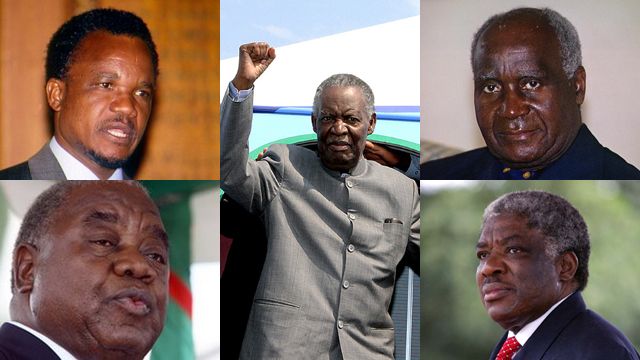| Home » Articles » Notebook |
Clarifyng SI 33
| Speaking at the meeting Banda made it clear that the government was no longer willing to standby and allow businesses to contravene the law as regards the use of the legal tender for domestic transactions in Zambia. ‘The authority that is the government and the Bank of Zambia have made it very clear that there is no intention to introduce exchange controls. That is a very paramount issue, which I think the business community must take away. And whatever measures have been introduced so far, I don’t think by any international practice one can in any way imply that exchange controls have been introduced. ‘There’s also been statements, which have been made, which imply foreign currency accounts, have been banned. Again that is not correct. ‘SI 33 states that we should not quote, demand, be paid or receive payment in foreign currency for domestic transactions. International based practice implies that a domestic transaction is one, which is conducted between two parties who are resident within that jurisdiction. This implies that when dealing with entities, which are not locally registered and are outside Zambia’s jurisdiction, business entities would be expected to transact in foreign currency.’ Banda said that the matter of dollarization has existed in Zambia for a long time. He said that by 1999 stakeholders had started debating this issue and between 2000 and 2002, directives were issued to ban quoting or using dollars or any other foreign currency in domestic transactions. ‘It appears these directives did not have legal backings. But the situation has changed, we are now talking of a law. It is expected that we will abide by the law. And the question is how do we operate in this environment rather than whether we should or not. I think we should focus our effort on how we’ll cooperate in this environment.’ Explaining why measures had been introduce to cartel dollarization Banda said the reasons vary from economical, quasi political and nationalistic. ‘It’s clear that as a country we need to have some sense of economic nationalism within us. ‘Since independence, the legal tender has been the kwacha, surely we should have that respect for the kwacha and it should be used for domestic transactions.’ Banda said because the law to use the local currency has been ignored, some of the business transactions that have taken place in the past have been illegal. He said the SI 33 is just reinforcing the fact that the kwacha is the sole legal tender in Zambia. ‘Most of the policies which government undertakes tend to be in the interest of a wider population. Of course special interest groups and business have to always be accommodated in such a way that they prosper and that they contribute to economic development of the country. If you look at dollarization and it’s effect, not only in Zambia but also in other countries, it does in many ways exclude the poor. It’s a phenomenal that tends to be exclusive because the poor don’t earn dollars, the poor have no means of exporting and having foreign currency income and therefore, they get the brunt of dollarization in that it encourages a sense of not having the responsibility to ensure that the exchange rate is stable. Those who earn dollars at times don’t mind how much the kwacha moves, whichever way it moves they feel it’s somehow hedged. But that of course, can be a problem to the vulnerable. And to take it further, I think if we do have a parallel economy within this country, which is based on foreign currency transactions, we’ll be excluding certain components of our population. We have to make sure that we do not disadvantage those who are vulnerable, the poor or those who do not have access to the dollar. ‘In addition to affecting the poor, certain business practices which have been conducted in dollars are difficult for the authorities to monitor whether the relevant taxes are being paid. These are issues, which have concerns to the authorities and have ultimately led to the introduction of SI 33. ‘Any central banker will never be in support of any form of dollarization because it renders monitory policy totally ineffective. If an economy is 80%, 60%, 50% dollarized, then whatever the central bank does, it has no effect. The central bank can’t control inflation, will not have any influence on the exchange or interest rates because its influence is only on the local currency meanwhile, the bigger component of that economy is being run on a different currency. ‘We do sympathize with entities that have borrowed in foreign currency, and they have foreign currency liabilities although our expectations would have been that any entity who would go out there to borrow foreign currency would have been certain that they also earn foreign currency in the business venture because really, if you borrow in foreign currency and you are going to earn kwacha, you’re taking a huge exchange rate risk, with or without SI 33.’ ZACCI Emotions run high on SI 33 Geoffrey Sakulanda, ZACCI president said, ‘The introduction of SI 33 has created a lot of anxiety in the business community and has the potential of eroding the confidence levels in the country and can affect the performance of the kwacha, the private sector and the overall economy in the long run, if not managed properly. ‘SI 33 has introduced huge change in the business environment as it has existed over the past couple of decades suddenly, without prior consultation, no prior notice and no grace period.’ While ZACCI acknowledges that Bank of Zambia may have less control over the monetary policy by allowing US dollar and other foreign currencies, it however, argues that allowing foreign currency transactions in the market with reasonably prudent fiscal policy will and can in the long run, bring stability and strength in the market and will keep the inflation low and positively contribute to several other areas of growth. ZACCI further argues that the vulnerability of copper price in the international market can and has, on occasions introduced turbulence in the foreign exchange market in our economy. Among the Key issues that will affect business ZACCI says are • The key pricing on the supply of high value imported goods are that the Zambian kwacha equivalent will vary frequently depending on its fluctuations against the dollar. Therefore, businesses houses will be forced to mark up the kwacha prices in order to mitigate this risk. • Tenders prices that are usually valid for 90-120 days for the supply of goods to be imported from abroad can also be affected by major fluctuations in the exchange rate. This is most likely going to disadvantage the local bidders especially on government tenders, which always require that quoted prices be fixed with no room for variations. • Business houses had already planned annual budgets, the measure of this magnitude will have a negative impact on their operations. • Some businesses have borrowed in dollar terms and using the dollar interest rates. With this change, these businesses will be exposed to serious and injurious foreign exchange risks. • For exporting companies with customers currently invoice in foreign currency, should the kwacha get stronger, the exporting company will have a huge cost locked into the cost structure. Resulting in eroded income in kwacha terms to meet the kwacha obligations. This in turn means lost tax revenue to the government. • Overall, this regulation on foreign currency transactions has the potential to create distortions in the economy which can boost informal activities at the expense of the formal economy, with adverse effects for official sources of foreign currency sources and government revenues. ‘ZACCI further argues that SI 33 has the potential of creating a foreign currency shortage in Zambia as businesses will opt to do their banking offshore in the absence of other measures, adding to the possibility of the resumption of foreign exchange controls. This may give rise to informal foreign exchange activities and may lead to further depreciation of the kwacha. It should be noted that an overvalued exchange rate as a result of the emergence of the parallel foreign exchange market can lead to foreign exchange rationing and multiple exchange rates which are key deterrents to private sector activity, economic growth, and diversification. On the other hand, the official exchange rate may fail to anchor inflation expectations as a significant share of imports maybe priced at the depreciated parallel market exchange rate. ‘Therefore, instead of bringing a blanket ban on quoting prices in US dollars, a win-win decision would be to think about boosting the foreign currency reserves, which will enhance the economy of Zambia,’ Sakulanda said. | |
| Views: 9798 | Comments: 2 | |
| Total comments: 0 | |


